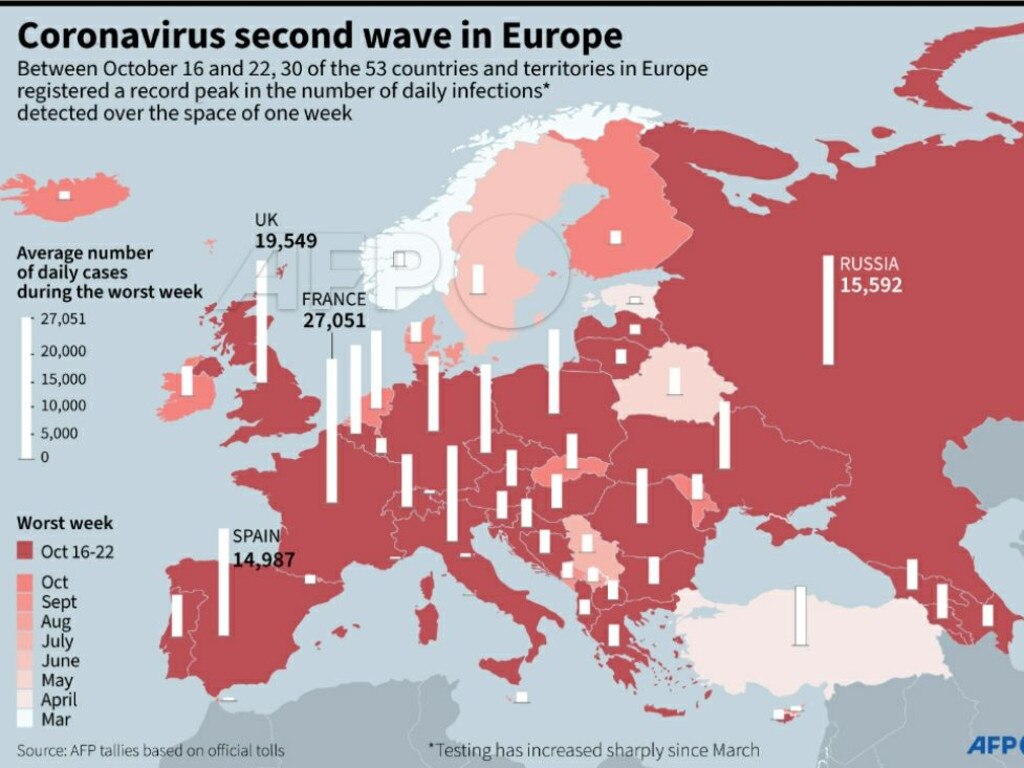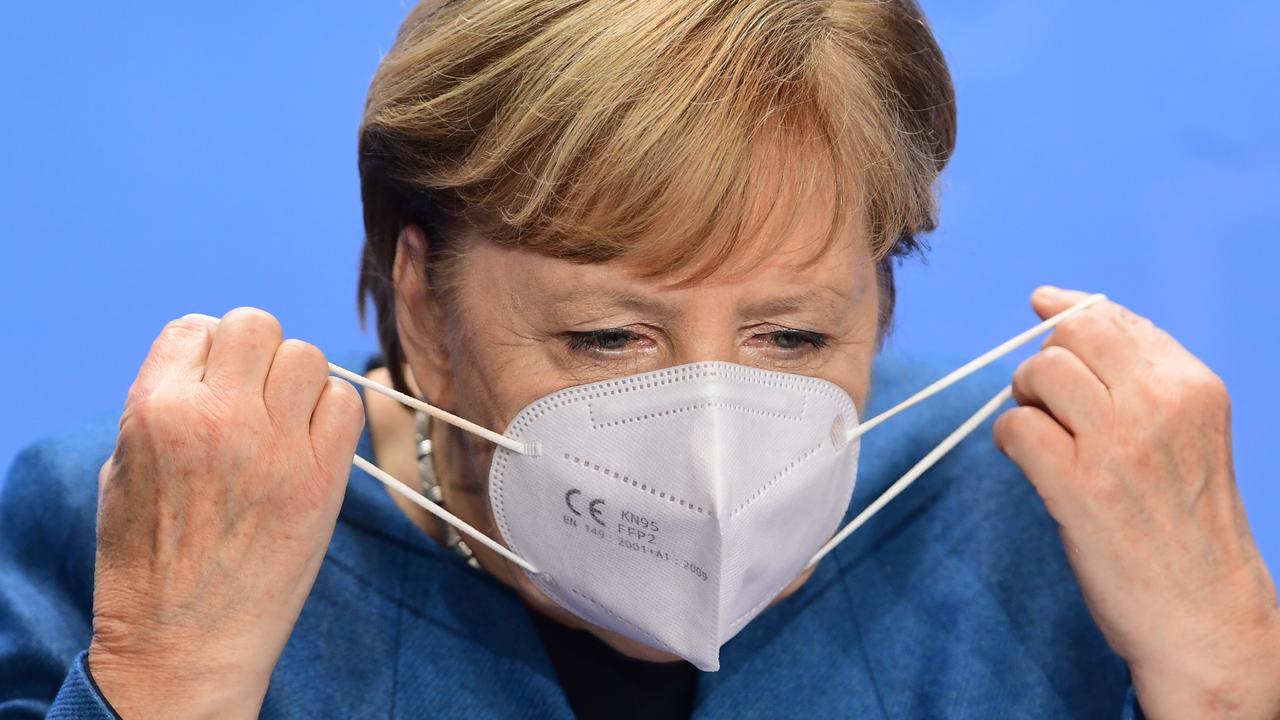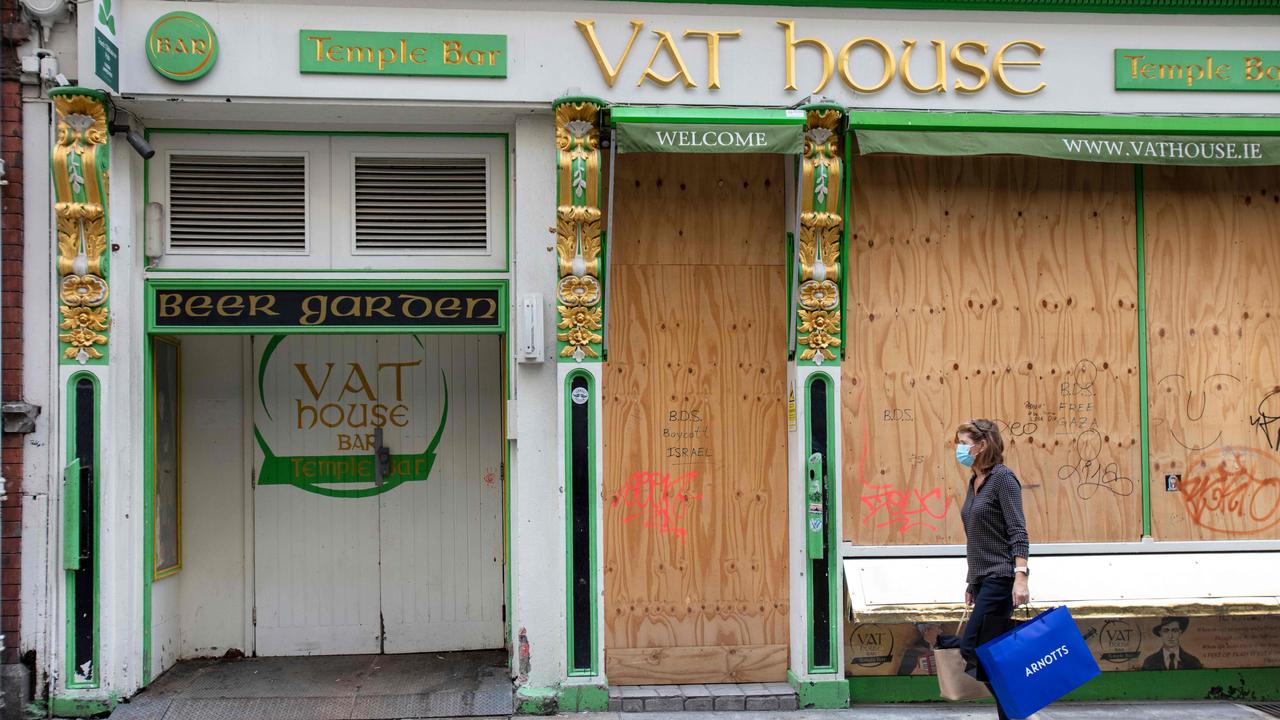France and Germany locked down amid coronavirus chaos in Europe
Two more major European nations have gone back into full lockdowns as the continent struggles with a massive increase in virus cases.

France and Germany have gone back into national lockdowns as Europe struggles with a huge surge in coronavirus cases.
Germany ordered a new round of shutdowns for the culture and leisure, and food and drink sectors, in a bid to halt a spike in new COVID-19 infections.
The tough restrictions come into force from Monday, November 2 until the end of the month.
They limit contact outdoors to people from two households. Schools, daycare centres and shops will remain open, but hotel stays will be allowed only for “necessary and expressedly non-tourism purposes”.
Bars, cafes and restaurants must shut, although takeaways and delivery services can continue.
Professional sports, including Bundesliga football, have also been pushed back behind closed doors.
Theatres, opera houses and cinemas will also have to scrap their shows during what is traditionally their busiest season.
RELATED: Follow our live coronavirus updates
RELATED: Sweden’s U-turn on virus lockdown

German Chancellor Angela Merkel acknowledged that the measures are “strict and arduous” but she urged a “national effort”.
At the current rate of new infections, she said: “We will reach the limits of the health system.”
The number of new cases had doubled today from a week ago, while the number of people in intensive care had also doubled in the last 10 days, she said.
“The curve must be flattened again … so that contact tracing can be once again carried out.”
The leader said in three out of four cases now, officials are no longer able to determine where the transmission occurred.
Germany coped relatively well with the first coronavirus wave earlier in the year but numbers have risen rapidly in recent weeks, as they had across the rest of Europe.
The tally of new daily cases in the nation now regularly crosses the 10,000 mark, and hit a new 24-hour record of 14,964 on Wednesday, according to data from the Robert Koch Institute (RKI) for disease control.
RELATED: Disturbing map shows America in trouble
RELATED: Europe’s second wave worst than first

That is still well below figures seen in neighbouring France, where daily cases have topped 50,000, or Belgium where hospitals are reaching capacity.
But the number of COVID-19 patients in intensive care in Germany has also surged, from just under 400 in early October to 1570 by Wednesday.
FRANCE ALSO IN LOCKDOWN
Just hours after the German announcement, French President Emmanuel Macron announced a new coronavirus lockdown until at least December 1, hoping to bring under control an outbreak that is poised to overwhelm hospitals in a matter of days.
“The virus is spreading across France at a speed that even the most pessimistic did not predict,” Mr Macron said in a television address.
He admitted that a curfew for Paris and other major cities imposed two weeks ago had failed to stop a second wave of cases that has sent the death toll in France spiralling to nearly 35,000.
“As elsewhere in Europe, we are overwhelmed by a second wave that will probably be more difficult and deadly than the first,” he said.
RELATED: Eerie photos of Paris under lockdown
RELATED: Europe in chaos as cases surge

“If we did nothing … within a few months we would have at least 400,000 additional deaths,” he said.
Already more than 3000 intensive care patients are forcing hospitals to scramble for beds.
“No matter what we do, nearly 9000 people will be in intensive care by mid-November,” he warned.
LOCKDOWNS IN OTHER NATIONS
Ireland became the first to lock down its citizens for a second time last week. Its almost five million people have been told to stay at home for six weeks.
Wales followed suit on Friday, with a two-week circuit-breaker lockdown.
Some 150,000 people scattered over three virus-hit districts in northern Portugal have also been locked down.
RELATED: New test reveals coronavirus superspreaders
RELATED: Fury as Tesco refuses to sell sanitary products in Wales

Beyond Europe, Israel, Lebanon, New Zealand and large parts of the Philippines have also had to go into a second lockdown.
Spain, Belgium, Slovenia, Slovakia and Czech Republic have since declared national curfews, while Italy and Greece have declared regional and metropolitan ones.
Many countries and cities have also required mask-wearing in public, with bars forced to close and sports and cultural gatherings also restricted.



